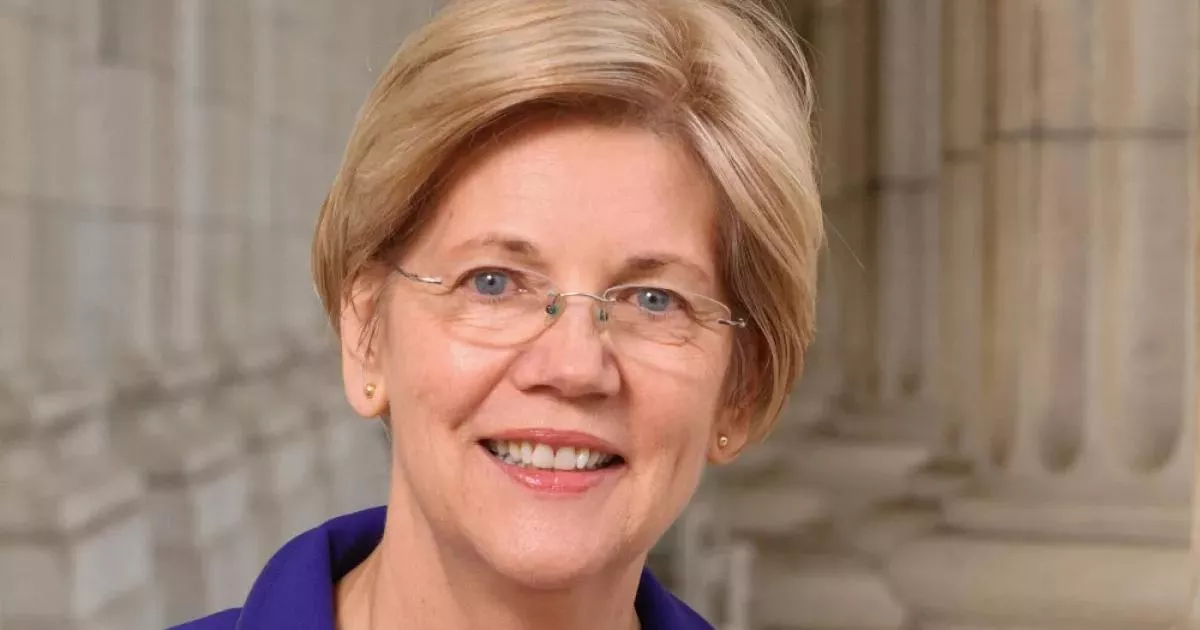Elizabeth Warren is a prominent American politician and the senior U.S. Senator from Massachusetts since 2013. As a Democrat known for her progressive views, she champions consumer protection, economic equality, and social welfare programs. Warren gained national attention as a 2020 presidential candidate, where she advocated for significant reforms. Before entering politics, she was a distinguished law professor specializing in bankruptcy. Her policy proposals and advocacy have positioned her as a leading voice in contemporary American political discourse, particularly on issues of economic fairness and corporate accountability.
1911: Birth of Donald Jones Herring
In 1911, Donald Jones Herring, Elizabeth Warren's father, was born. He later served as a U.S. Army flight instructor during World War II.
1912: Birth of Pauline Louise Reed
In 1912, Pauline Louise Reed, Elizabeth Warren's mother, was born. She later married Donald Jones Herring and became a homemaker.
June 22, 1949: Elizabeth Warren Born in Oklahoma City
On June 22, 1949, Elizabeth Ann Herring, now known as Elizabeth Warren, was born in Oklahoma City, Oklahoma.
June 22, 1949: Elizabeth Warren's Birth
On June 22, 1949, Elizabeth Ann Warren (née Herring) was born in Oklahoma City, Oklahoma.
1968: Left George Washington University
In 1968, Elizabeth Warren left George Washington University after two years to marry James Robert "Jim" Warren, whom she had met in high school.
1970: Graduated from the University of Houston
In 1970, Elizabeth Warren graduated from the University of Houston with a Bachelor of Science degree in speech pathology and audiology.
1970: Taught Children with Disabilities
In 1970, after obtaining her degree but before enrolling in law school, Elizabeth Warren taught children with disabilities for a year in a public school.
1976: Received Juris Doctor
In 1976, Elizabeth Warren received her Juris Doctor and passed the bar examination shortly thereafter. She also became pregnant with her second child, Alexander.
1976: Voted for Gerald Ford
In 1976, Elizabeth Warren voted for Gerald Ford in the presidential election, which was the only time she voted for the Republican nominee in the six presidential elections before 1996.
1977: Lecturer at Rutgers
In 1977, Elizabeth Warren began her career in academia as a lecturer at Rutgers University, Newark School of Law.
1978: Moved to University of Houston Law Center
In 1978, Elizabeth Warren moved to the University of Houston Law Center.
July 12, 1980: Warren Marries Bruce H. Mann
On July 12, 1980, Elizabeth Warren married law professor Bruce H. Mann, her second husband, but chose to retain her first husband's surname.
1980: Associate Dean at University of Houston
In 1980, Elizabeth Warren became an associate dean at the University of Houston Law Center.
1980: Published Article on Public Utilities
In 1980, Elizabeth Warren published an article in the Notre Dame Law Review arguing that public utilities were over-regulated and that automatic utility rate increases should be instituted.
1983: University of Texas School of Law Professor
In 1983, Elizabeth Warren returned to the University of Texas School of Law as a full professor after being a visiting associate professor in 1981.
1984: Warren identified herself as Cherokee in cookbook
In 1984, Elizabeth Warren contributed recipes to a Native American cookbook and identified herself as Cherokee.
1985: Visiting Professor at University of Michigan
In 1985, Elizabeth Warren was a visiting professor at the University of Michigan.
1986: Warren identified her race as 'American Indian' on a State Bar of Texas form
In 1986, Elizabeth Warren identified her race as "American Indian" on a State Bar of Texas write-in form used for statistical information gathering.
1987: End of UT Austin Position
In 1987, Elizabeth Warren concluded her time as a research associate at the Population Research Center of the University of Texas at Austin and as a professor at the University of Texas School of Law.
1987: Joined University of Pennsylvania Law School
In 1987, Elizabeth Warren joined the University of Pennsylvania Law School as a full professor.
1989: Published 'As We Forgive Our Debtors'
In 1989, Elizabeth Warren, along with colleagues Teresa A. Sullivan and Jay Westbrook, published their research in the book "As We Forgive Our Debtors."
1990: Obtained Endowed Chair
In 1990, Elizabeth Warren obtained an endowed chair at the University of Pennsylvania Law School, becoming the William A. Schnader Professor of Commercial Law.
1991: Registered as a Republican
Elizabeth Warren was registered as a Republican from 1991 to 1996.
1992: Visiting Professor at Harvard Law School
In 1992, Elizabeth Warren taught for a year at Harvard Law School as the Robert Braucher Visiting Professor of Commercial Law.
1995: Harvard Law School lists Warren as Native American
From 1995 to 2004, Elizabeth Warren's employer, Harvard Law School, listed her as a Native American in its federal affirmative action forms; Warren later said she was unaware of this.
1995: Public Policy Involvement
In 1995, Elizabeth Warren began her involvement in public policy by working to oppose what eventually became the 2005 act restricting bankruptcy access for individuals.
1995: Began Voting Democratic
In 1995, Elizabeth Warren began to vote Democratic because she no longer believed that the Republicans were the party who best supported markets.
1995: Professor at Harvard Law School
In 1995, Elizabeth Warren left the University of Pennsylvania to become the Leo Gottlieb Professor of Law at Harvard Law School.
1995: Advisor to National Bankruptcy Review Commission
In 1995, Elizabeth Warren was asked to advise the National Bankruptcy Review Commission by its chair, former congressman Mike Synar.
1995: Death of Pauline Louise
In 1995, Pauline Louise (Reed) Herring, Elizabeth Warren's mother, passed away.
1996: Republican Party Affiliation Ends
Elizabeth Warren's Republican Party affiliation ended in 1996, after being registered as a Republican since 1991.
1996: Highest-Paid Professor at Harvard
In 1996, Elizabeth Warren became the highest-paid professor at Harvard University who was not an administrator.
1997: Death of Donald Jones Herring
In 1997, Donald Jones Herring, Elizabeth Warren's father, passed away.
2004: Harvard Law School lists Warren as Native American
From 1995 to 2004, Elizabeth Warren's employer, Harvard Law School, listed her as a Native American in its federal affirmative action forms; Warren later said she was unaware of this.
2004: Publication of 'The Two-Income Trap'
In 2004, Elizabeth Warren and her daughter, Amelia Tyagi, wrote 'The Two-Income Trap: Why Middle-Class Mothers and Fathers Are Going Broke,' examining the financial struggles of middle-class families.
2004: Appearance on Dr. Phil Show
In 2004, Elizabeth Warren began to rise in prominence with an appearance on the Dr. Phil show, and published several books including The Two-Income Trap.
2004: Article in Washington University Law Review
In 2004, Elizabeth Warren published an article in the Washington University Law Review arguing that correlating middle-class struggles with over-consumption was a fallacy.
2005: Most-Cited Scholars
From 2005 to 2009, Elizabeth Warren was among the three most-cited scholars in the fields of bankruptcy and commercial law.
2005: Study on bankruptcy and medical bills
In 2005, Elizabeth Warren and David Himmelstein published a study on bankruptcy and medical bills, finding that half of all families filing for bankruptcy did so after a serious medical problem, with three-quarters having medical insurance.
2005: Bankruptcy Act Opposition
In 2005, an act restricting bankruptcy access for individuals, which Elizabeth Warren had opposed since 1995, was passed.
2005: Bankruptcy Abuse Prevention and Consumer Protection Act Passed
In 2005, despite Elizabeth Warren's opposition, Congress passed the Bankruptcy Abuse Prevention and Consumer Protection Act of 2005, which curtailed consumers' ability to file for bankruptcy.
2006: Member of FDIC Advisory Committee
From 2006 to 2010, Elizabeth Warren was a member of the FDIC (Federal Deposit Insurance Corporation) Advisory Committee on Economic Inclusion.
November 14, 2008: Appointed Chair of Congressional Oversight Panel
On November 14, 2008, Elizabeth Warren was appointed by U.S. Senate majority leader Harry Reid to chair the five-member Congressional Oversight Panel created to oversee the implementation of the Emergency Economic Stabilization Act.
2008: Economic backlash to financial crisis
Brian Stelter agreed with Green's analysis that Warren helped lead an economic backlash to the 2008 financial crisis that pulled the Democratic party leftward.
2008: Critical of the Obama administration's response to the 2008 financial crisis
Elizabeth Warren had been critical of the Obama administration's response to the 2008 financial crisis.
2008: Advocacy for Banking Regulations
In 2008, Elizabeth Warren's national profile grew due to her strong public stances in favor of stricter banking regulations after the 2008 financial crisis.
2009: Most-Cited Scholars
From 2005 to 2009, Elizabeth Warren was among the three most-cited scholars in the fields of bankruptcy and commercial law.
2009: Awards and honors received in 2009
In 2009, The Boston Globe named Elizabeth Warren the Bostonian of the Year, and she also received the Lelia J. Robinson Award from the Women's Bar Association of Massachusetts. Additionally, she became the first professor in Harvard's history to win the law school's Sacks–Freund Teaching Award for a second time.
July 2010: CFPB Established by Dodd-Frank Act
In July 2010, the Consumer Financial Protection Bureau (CFPB) was established by the Dodd–Frank Wall Street Reform and Consumer Protection Act, which was signed into law by President Obama.
September 2010: Named Special Advisor for CFPB
In September 2010, President Obama named Elizabeth Warren Assistant to the President and Special Advisor to the Secretary of the Treasury on the CFPB to set up the new agency.
2010: Member of FDIC Advisory Committee
From 2006 to 2010, Elizabeth Warren was a member of the FDIC (Federal Deposit Insurance Corporation) Advisory Committee on Economic Inclusion.
2010: Brown Won Senate Seat
In 2010, Republican Scott Brown had won the U.S. Senate seat in a special election after Ted Kennedy's death, which Elizabeth Warren sought to win back in 2012.
2010: Warren named one of the most influential attorneys of the decade
In 2010, The National Law Journal named Elizabeth Warren one of the 40 most influential attorneys of the decade, after repeatedly naming Warren one of the Fifty Most Influential Women Attorneys in America.
September 14, 2011: Declared Senate Candidacy
On September 14, 2011, Elizabeth Warren declared her intention to run for the Democratic nomination for the 2012 election in Massachusetts for the U.S. Senate.
2011: Harvard's Only Tenured Public Law School Professor
As of 2011, Elizabeth Warren was Harvard's only tenured law professor who had attended law school at an American public university.
2011: Awards and honors received in 2011
In 2011, Elizabeth Warren delivered the commencement address at Rutgers Law School and received an honorary Doctor of Laws degree and membership in the Order of the Coif. Additionally, she was inducted into the Oklahoma Hall of Fame.
2011: Impetus for CFPB Establishment
In 2011, Elizabeth Warren's scholarship and public advocacy were the impetus for establishing the Consumer Financial Protection Bureau.
January 2012: Named one of the top 20 US progressives
In January 2012, New Statesman magazine named Elizabeth Warren one of the "top 20 U.S. progressives".
January 2012: Cordray Appointed to CFPB
In January 2012, President Obama appointed former Ohio attorney general Richard Cordray as the director of the CFPB in a recess appointment, due to concerns that Elizabeth Warren could not win Senate confirmation.
2012: Scott Brown speculates Warren fabricated Native ancestry
During Elizabeth Warren's first Senate race in 2012, her opponent, Scott Brown, speculated that she had fabricated Native ancestry to gain an advantage in the employment market and used Warren's ancestry in several attack ads.
2012: Campaign for US Senate
In 2012, Elizabeth Warren campaigned for the U.S. Senate in Massachusetts.
2012: Elected as U.S. Senator
In 2012, Elizabeth Warren defeated incumbent Republican Scott Brown and became the first female U.S. senator from Massachusetts.
2012: Warren says being Native American has been part of her story
In 2012, Elizabeth Warren stated that "being Native American has been part of my story, I guess, since the day I was born".
2012: Warren's 2012 Senate Campaign
In 2012, Michelle Wu, who later became the mayor of Boston, worked on Elizabeth Warren's Senate campaign. Steven W. Tompkins, who later became the Suffolk County Sheriff, also started his political career working on Warren's 2012 campaign.
2012: Obama Echoed Warren's Sentiments
In 2012, President Obama echoed Elizabeth Warren's sentiments in an election campaign speech.
2012: Named among top US progressives
In 2012, the British magazine New Statesman named Elizabeth Warren among the "top 20 U.S. progressives".
2013: Became U.S. Senator
In 2013, Elizabeth Warren became the senior United States Senator from the state of Massachusetts.
2013: Michelle Wu runs for Boston City Council
In 2013, Michelle Wu, a former law student of Elizabeth Warren and campaign worker for Warren's 2012 Senate campaign, ran for Boston City Council.
April 2014: Publication of 'A Fighting Chance'
In April 2014, Metropolitan Books published Elizabeth Warren's book 'A Fighting Chance', which reflects on the decline of the American dream for middle-class families.
2015: Named one of Time magazine's 100 Most Influential People
Elizabeth Warren was named one of Time magazine's 100 Most Influential People in the World in 2015.
2016: Warren seen as leading figure in the Democratic Party
After the 2016 election of Donald Trump, many commenters saw Warren as one of the de facto leading figures in a national Democratic Party that lacked a clear singular post-Obama leader.
2016: Pressuring Clinton on potential appointees
In 2016, Elizabeth Warren continued her efforts to pressure Hillary Clinton on potential appointees, aiming to prevent Wall Street-friendly individuals from being appointed to her administration.
2016: Effort to shape Hillary Clinton's administration
In 2016, Elizabeth Warren engaged in an effort to shape the administration Hillary Clinton would lead if she won the election, quietly working to influence how Clinton might staff an administration, as described in Stern's 2024 book.
2016: Influence on Hillary Clinton
In 2016, Elizabeth Warren influenced 2016 Democratic nominee Hillary Clinton on the matter of staffing presidential administrations.
2016: Foreign government attacked election
In April 2019, after reading the Mueller report, Elizabeth Warren called on the House of Representatives to begin impeachment proceedings against Donald Trump, asserting that he welcomed help from a hostile foreign government during the 2016 election and obstructed the investigation into that attack.
January 2017: Presidential Conflicts of Interest Act read in the Senate
In January 2017, the Presidential Conflicts of Interest Act, written by Elizabeth Warren, was first read in the Senate.
April 2017: Publication of 'This Fight Is Our Fight'
In April 2017, Elizabeth Warren published her 11th book, 'This Fight Is Our Fight: The Battle to Save America's Middle Class', addressing the plight of the American middle class.
2017: Named one of Time magazine's 100 Most Influential People
Elizabeth Warren was named one of Time magazine's 100 Most Influential People in the World in 2017.
July 2018: Trump promises donation for DNA test result
At a July 2018 Montana rally, President Donald Trump promised that if he debated Elizabeth Warren, he would pay $1 million to her favorite charity if she took a DNA test and "it shows you're an Indian".
October 2018: Warren releases DNA test analysis
In October 2018, Elizabeth Warren released an analysis of a DNA test by geneticist Carlos D. Bustamante that found her ancestry to be mostly European but "strongly support[ed] the existence of an unadmixed Native American ancestor".
2018: Boston Globe investigates Warren's claim to Native American ethnicity
A 2018 Boston Globe investigation found that Elizabeth Warren's reported ethnicity played no role in her rise in the academic legal profession.
2018: Warren calls for abolishing ICE
In 2018, Elizabeth Warren called for abolishing U.S. Immigration and Customs Enforcement (ICE) due to her criticism of Trump's immigration policies.
2018: Re-elected as U.S. Senator
In 2018, Elizabeth Warren was reelected as a U.S. Senator, defeating Republican nominee Geoff Diehl.
2018: Women's History Month theme refers to McConnell's remark about Warren
In 2018, the Women's History Month theme in the United States was "Nevertheless, She Persisted: Honoring Women Who Fight All Forms of Discrimination Against Women", referring to McConnell's remark about Elizabeth Warren.
January 2019: Warren discusses DNA testing in Iowa
During a January 2019 public appearance in Sioux City, Iowa, Elizabeth Warren responded to a question about her DNA testing, clarifying that she is not a person of color or a citizen of a tribe and that tribal citizenship is determined by tribes, not DNA tests.
January 2019: Warren criticizes Trump's decision to withdraw troops from Syria and Afghanistan
In January 2019, Elizabeth Warren criticized Trump's decision to withdraw U.S. troops from Syria and Afghanistan, arguing that such withdrawals should be part of a coordinated plan with U.S. allies.
February 9, 2019: Announced Presidential Candidacy
On February 9, 2019, Elizabeth Warren announced her candidacy in the 2020 United States presidential election.
February 2019: Warren apologizes for identifying as Native American
In February 2019, Elizabeth Warren apologized for having identified as Native American.
February 2019: Warren visits Native American conference
In February 2019, Elizabeth Warren received a standing ovation during a surprise visit to a Native American conference, where she was introduced by Representative Deb Haaland.
April 2019: Warren calls for impeachment proceedings against Trump
In April 2019, after reading the Mueller report, Elizabeth Warren called on the House of Representatives to begin impeachment proceedings against Donald Trump, asserting that he welcomed help from a hostile foreign government during the 2016 election and obstructed the investigation into that attack.
July 2019: Haaland endorses Warren for president
In July 2019, Representative Deb Haaland endorsed Elizabeth Warren for president, calling her "a great partner for Indian Country".
August 2019: Warren apologizes before Native American Forum
In August 2019, Elizabeth Warren apologized again before a Native American Forum in Iowa for causing confusion over issues of tribal sovereignty and citizenship.
2019: Alex Thompson reports on Warren's efforts
In 2019, Alex Thompson reported in Politico on Elizabeth Warren's efforts ahead of the 2016 election to pressure Hillary Clinton on potential appointees.
2019: Supports federal moratorium on CAFO construction
In 2019, Elizabeth Warren expressed her support for a federal moratorium on Concentrated Animal Feeding Operations (CAFO) construction and expansion.
2019: Politico Article on Warren's Political Views
In 2019, Politico reported that a close high-school friend described Elizabeth Warren as a "diehard conservative" in high school, and colleagues noted changes in her political views over time.
March 5, 2020: Withdrew from Presidential Race
On March 5, 2020, after Super Tuesday, Elizabeth Warren withdrew from the 2020 United States presidential election.
April 23, 2020: Warren announces her brother's death
On April 23, 2020, Elizabeth Warren announced on Twitter that her eldest brother, Don Reed Herring, had died two days prior from COVID-19.
August 11, 2020: Kamala Harris announced as Biden's running mate
On August 11, 2020, Kamala Harris was officially announced as Joe Biden's running mate for the upcoming presidential election.
2020: 2020 Presidential Campaign
In 2020, Elizabeth Warren was a candidate in the Democratic Party presidential primaries, finishing third after Joe Biden and Bernie Sanders.
February 2021: Biden administration more receptive to Warren's input
In February 2021, Jeff Bridgood observed that the Biden administration appeared more receptive to Elizabeth Warren's input than the Obama administration had been, reflecting how the party had become more in line with her political philosophy.
March 2021: Influence on Biden's personnel decisions
In March 2021, it was reported that Elizabeth Warren has been a private but constant voice to the Biden administration on personnel decisions. Around that time, Zachary Warmbrodt of Politico noted her influence.
October 1, 2021: Warren announces her brother John's death
On October 1, 2021, Elizabeth Warren announced that her brother, John Herring, had died of cancer.
June 24, 2022: Warren requests Biden to unblock resources for reproductive health
After the June 24, 2022, Supreme Court ruling overturning Roe v. Wade, Elizabeth Warren wrote a New York Times op-ed requesting that President Biden unblock critical resources and authority that states and the federal government can use to meet the surge in demand for reproductive health services.
2022: Combined income of $1 million reported
In 2022, Elizabeth Warren and her husband reported a combined income of $1 million, with her salary as a U.S. Senator accounting for only a fifth of that sum.
2022: Warren votes for the Respect for Marriage Act
In 2022, Elizabeth Warren voted to advance legislation to codify same-sex marriage into federal law by voting for the Respect for Marriage Act.
March 13, 2023: Warren presents analysis of Silicon Valley Bank collapse in The New York Times
On March 13, 2023, Elizabeth Warren presented a detailed analysis of the collapse of Silicon Valley Bank on March 10, 2023, and provided possible solutions to avoid further bank failures, in The New York Times.
March 2024: Warren urges US recognition of Palestinian state
In March 2024, Elizabeth Warren was one of 19 Democratic senators to sign a letter to the Biden administration urging the U.S. to recognize a "nonmilitarized" Palestinian state after the war in Gaza.
2024: Re-elected to Senate
In 2024, Elizabeth Warren was reelected to a third Senate term against Republican nominee John Deaton.
2024: Stern's book
In 2024, Stern released a book which mentioned Warren's efforts in 2016 to shape the administration Hillary Clinton would lead if she won the election.
2024: Warren is shaping the Democratic Party
In his 2024 book The Rebels: Elizabeth Warren, Bernie Sanders, Alexandria Ocasio-Cortez, and the Struggle for a New American Politics, Joshua Green cites Warren as a major figure in shaping the Democratic Party's embrace of more leftward politics in the dozen years after the Great Recession.

2025: Net worth estimated at $8 million
As of early 2025, TheStreet.com estimates Elizabeth Warren's net worth to be at least $8 million.
2040: Phase out existing CAFO operations
In 2019, Elizabeth Warren cosponsored a bill to phase out existing Concentrated Animal Feeding Operations (CAFO) by 2040.
Mentioned in this timeline

Donald John Trump is an American politician media personality and...

Bernie Sanders is a prominent American politician currently serving as...

Bill Clinton the nd U S President - served as...

Barack Obama the th U S President - was the...

Alexandria Ocasio-Cortez AOC is a prominent American politician and activist...

Hillary Diane Rodham Clinton is a prominent American politician lawyer...
Trending

48 minutes ago Oklahoma Sooners Honor Buddy Hield and 2016 Final Four Team.
49 minutes ago Moldova's Veterinary Education to modernize through the EDUVET European Project for enhancement.

49 minutes ago Brendan Fraser as Eisenhower in 'Pressure': D-Day drama unfolds with weather worries.

49 minutes ago Cade Cunningham's 42 Points Leads Pistons Over Knicks; Brunson's Performance Notable.

50 minutes ago Usha Vance's diaper request sparks controversy during pregnancy: A novel approach?

2 hours ago Learner Tien at Delray Beach Open: Fritz ousted, Paul advances, Korda previewed.
Popular

Jesse Jackson is an American civil rights activist politician and...

Barack Obama the th U S President - was the...

Bernie Sanders is a prominent American politician currently serving as...

Ken Paxton is an American politician and lawyer serving as...

Michael Joseph Jackson the King of Pop was a highly...
Randall Adam Fine is an American politician a Republican who...





